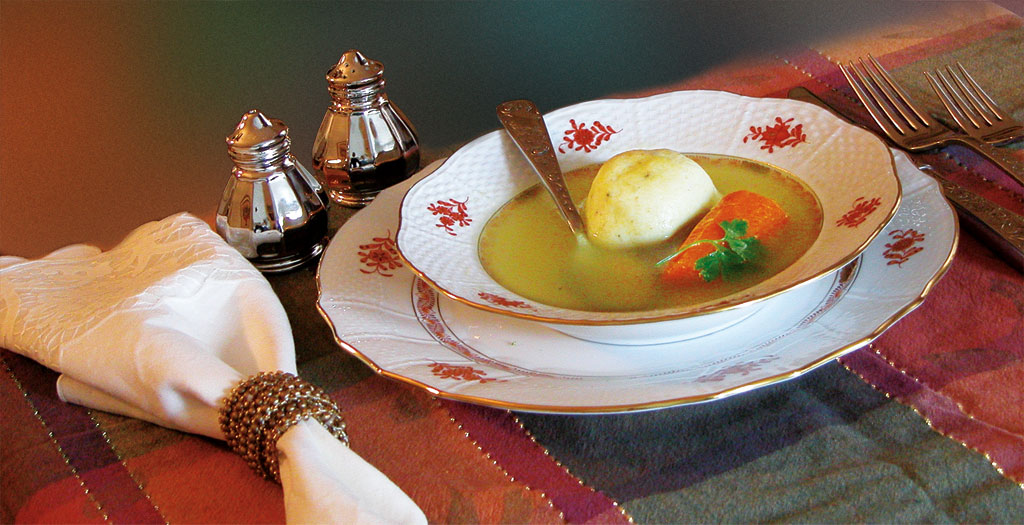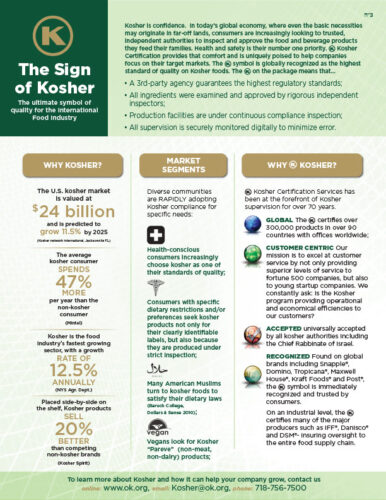Not too long ago, adhering to kosher dietary laws was the default Jewish thing to do. Today, the reality has largely reversed. Many Jews who proudly identify as Jews consider kosher laws to have lost their relevance.
Our thinking has changed. We no longer know why Judaism places such emphasis on eating and drinking, basic necessities shared not only by all mankind but by animals and plant life as well.
We ask, “Does G-d really care what I eat?” Without a satisfactory explanation, without the simple faith in Torah values that characterized former generations, many Jews conclude that keeping kosher is simply obsolete – that it is based upon ancient health precautions which no longer apply to modern life.
In Search of an Answer
In addition to the laws, Jewish tradition provides many insights into the mitzvah of kosher. We hope that by sharing these insights, you will gain a greater understanding and motivation to keep the mitzvoth of the Torah in the face of opposing values from contemporary culture.
Nevertheless, it should be understood that the Torah’s commandments are of Divine origin and can never be fully comprehended by human intellect. We keep the mitzvoth because they are G-d’s gift to the Jewish people.
Part I: The Spirit of Kosher
Religion is popularly portrayed as dealing with prayer, meditation, charity, ethics and sometimes various forms of self-denial. These understandings view the soul as purely spiritual and the body as completely physical. The former is concerned with mission and meaning; the latter with survival and pleasure.
Judaism, however, specifically encompasses every aspect of life. The Torah tells us not to reject the physical but rather to sanctify it. When we follow the Torah dictum to “know Him in all your ways” our most ordinary daily activities become imbued with holiness while the highest spirits are further raised by our careful attention.
Kosher represents this meeting of body and soul.
In this vein, we sanctify the act of eating by eating kosher food, and by reciting a blessing before and after we partake.
Part II: The Meaning of Kosher
Kosher food is the diet of spiritual nutrition for the Jewish neshamah, (soul). It is designed to bring refinement and purification to the Jewish people.
What does this mean? Modern nutritional science recognizes what Judaism has always taught: to a large extent, we are what we eat. The food we eat is absorbed into our flesh and blood. Birds of prey and carnivorous animals have the power to influence the eater with aggressive attributes. These are among the foods that are deemed not kosher and forbidden.
Forbidden foods are referred to in the Torah as abominations to the G-dly soul, elements that detract from our spiritual sensitivity. For a Jew, all non-kosher food diminishes spiritual sensitivity, reducing the ability to absorb concepts of Torah and mitzvoth. Both mind and heart are affected.
History demonstrates that when kosher observance is strong, Jewish identity remains strong. It is easy to see why kosher is often considered the farthest-reaching of all the mitzvoth.
Part III: The Power of Kosher
A Chassidic teaching based upon the mysticism of the Ari-Zal (Rabbi Yitzchak Luria) illustrates the power of kosher food: The Ari-Zal gave a literal interpretation of the verse, “Man does not live by bread alone, but by the word of G-d”. It is not the food itself that gives life, he explained, but rather the “word of G-d”—the spark of G-dliness—that is within the food.
All matter has within it some aspect of the “G-dly sparks” that give life and existence to the world. When we eat, the digestive system extracts the nutrients while the neshamah extracts the G-dly spark found in nature. The Divine energy in the food is thus the actual source of its ability to sustain and nourish the body.
Kosher food has a powerful energy that gives spiritual, intellectual and emotional strength to the Jewish neshamah. A Jewish person who consumes non-kosher food achieves the opposite effect. The kosher diet is truly the health-food diet for the soul, containing the spiritual nutrition necessary for Jewish survival.


 EN
EN  ZH
ZH  KR
KR  BR
BR  ES
ES  IN
IN  IL
IL 




